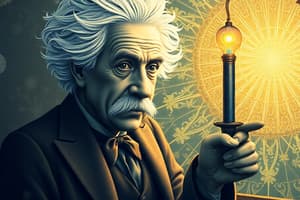Podcast
Questions and Answers
What are the two interrelated physics theories proposed by Albert Einstein?
What are the two interrelated physics theories proposed by Albert Einstein?
- Special relativity and general relativity (correct)
- Newtonian mechanics and general relativity
- Quantum mechanics and general relativity
- Classical mechanics and special relativity
Which theory explains the law of gravitation and its relation to the forces of nature?
Which theory explains the law of gravitation and its relation to the forces of nature?
- Quantum mechanics
- Classical mechanics
- General relativity (correct)
- Special relativity
What is the difference between special relativity and general relativity?
What is the difference between special relativity and general relativity?
- Special relativity applies to all physical phenomena in the absence of gravity, while general relativity explains the law of gravitation and its relation to the forces of nature. (correct)
- There is no difference between special relativity and general relativity.
- Special relativity applies to the cosmological and astrophysical realm, while general relativity applies to all physical phenomena in the absence of gravity.
- Special relativity explains the law of gravitation and its relation to the forces of nature, while general relativity applies to the cosmological and astrophysical realm.
What did relativity introduce to the field of physics?
What did relativity introduce to the field of physics?
What did relativity improve in the field of physics?
What did relativity improve in the field of physics?
What are some astronomical phenomena predicted by relativity?
What are some astronomical phenomena predicted by relativity?
When was the theory of special relativity published by Albert Einstein?
When was the theory of special relativity published by Albert Einstein?
When did the physics community understand and accept special relativity?
When did the physics community understand and accept special relativity?
What are some practical engineering concerns related to relativistic effects?
What are some practical engineering concerns related to relativistic effects?
Flashcards
General Relativity
General Relativity
Einstein's theory explaining the connection between gravity and the fabric of spacetime, affecting how objects move in the universe.
Special Relativity
Special Relativity
Einstein's theory describing the laws of physics in the absence of gravity, focusing on the relationship between space, time, and motion.
Spacetime
Spacetime
The idea that space and time are interconnected and form a single entity, representing the framework for all physical events.
Relativity of Simultaneity
Relativity of Simultaneity
Signup and view all the flashcards
Length Contraction
Length Contraction
Signup and view all the flashcards
What does General Relativity explain?
What does General Relativity explain?
Signup and view all the flashcards
What does Special Relativity explain?
What does Special Relativity explain?
Signup and view all the flashcards
What is a black hole?
What is a black hole?
Signup and view all the flashcards
What are gravitational waves?
What are gravitational waves?
Signup and view all the flashcards
Study Notes
Two Interrelated Physics Theories by Albert Einstein
- The theory of relativity encompasses two interrelated physics theories by Albert Einstein; special relativity and general relativity, proposed and published in 1905 and 1915, respectively.
- Special relativity applies to all physical phenomena in the absence of gravity, while general relativity explains the law of gravitation and its relation to the forces of nature and applies to the cosmological and astrophysical realm.
- Relativity transformed theoretical physics and astronomy during the 20th century, superseding a 200-year-old theory of mechanics created primarily by Isaac Newton.
- Relativity introduced concepts including 4-dimensional spacetime, relativity of simultaneity, kinematic and gravitational time dilation, and length contraction.
- In the field of physics, relativity improved the science of elementary particles and their fundamental interactions, along with ushering in the nuclear age.
- With relativity, cosmology and astrophysics predicted astronomical phenomena such as neutron stars, black holes, and gravitational waves.
- Albert Einstein published the theory of special relativity in 1905, building on many theoretical results and empirical findings.
- Einstein developed general relativity between 1907 and 1915, with contributions by many others after 1915.
- By the 1920s, the physics community understood and accepted special relativity, but general relativity did not appear to be as useful until around 1960.
- Relativity is a falsifiable theory, and its predictions have been confirmed in numerous tests since Einstein published his paper in 1905.
- General relativity has been confirmed many times, and its applications include satellite-based measurement, global positioning systems, and high-precision measurement of time.
- Relativistic effects are important practical engineering concerns.
Studying That Suits You
Use AI to generate personalized quizzes and flashcards to suit your learning preferences.





